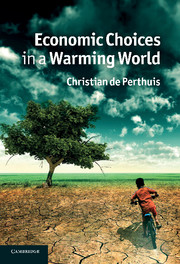Book contents
- Frontmatter
- Contents
- Acknowledgements
- Introduction
- 1 Climate risk
- 2 Some like it hot: adaptation to climate change
- 3 Building a low-carbon energy future
- 4 Pricing carbon: the economics of cap-and-trade
- 5 Intensifying agriculture to safeguard forests
- 6 The price of carbon: the economics of projects
- 7 Macroeconomic impacts: sharing carbon rent
- 8 International climate negotiations
- Conclusion
- References
- Appendix 1 Thirty key readings
- Appendix 2 Thirty key sets of figures
- Appendix 3 Greenhouse gas emissions around the world
- Glossary
- Index
8 - International climate negotiations
Published online by Cambridge University Press: 05 June 2012
- Frontmatter
- Contents
- Acknowledgements
- Introduction
- 1 Climate risk
- 2 Some like it hot: adaptation to climate change
- 3 Building a low-carbon energy future
- 4 Pricing carbon: the economics of cap-and-trade
- 5 Intensifying agriculture to safeguard forests
- 6 The price of carbon: the economics of projects
- 7 Macroeconomic impacts: sharing carbon rent
- 8 International climate negotiations
- Conclusion
- References
- Appendix 1 Thirty key readings
- Appendix 2 Thirty key sets of figures
- Appendix 3 Greenhouse gas emissions around the world
- Glossary
- Index
Summary
In his well-known paper ‘The Tragedy of the Commons’, Garrett Hardin (1968) describes the mechanisms through which natural resources are damaged as a result of being free of cost. He focuses on the example of the communal pastureland or ‘commons’ that surrounded English villages up until the end of the eighteenth century. Under this tenure system, the villagers all had access to communal grazing land for their livestock. In a situation of demographic stagnation, this social system provided them with a measure of security. Everyone had free access to a shared resource.
With a growing population, the system tended to destroy itself. Because access to the communal grazing land was free, in making their economic calculations the herdsmen took no account of the cost of this resource to the community. It was therefore in each herdsman's interest to have his animals graze on the common as long as a positive marginal revenue remained: a few blades of grass for the last animal taken to the pasture. Inevitably the outcome was overgrazing that reduced the fertility of the common to zero and led to the destruction of the collective good.
The complexity of international climate negotiations may be appreciated if one takes Hardin's example and replaces the word ‘village’ by ‘planet’ and the word ‘common’ by ‘the atmosphere’. The growth of the planet's population and its rising living standards are a threat to a very special collective good: the stability of the climate.
- Type
- Chapter
- Information
- Economic Choices in a Warming World , pp. 191 - 216Publisher: Cambridge University PressPrint publication year: 2011



